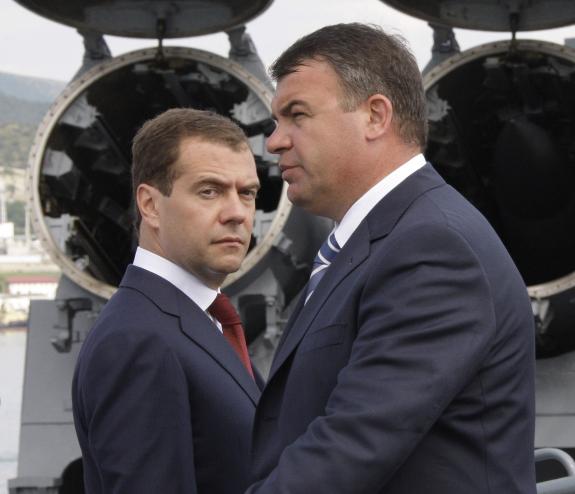
Pouring Money Fails to Redress Defense Industry Ills
Publication: Eurasia Daily Monitor Volume: 8 Issue: 145
By:

The present Russian constitution, adopted in 1993, was specifically tailored to give the president (at the time – the late Boris Yeltsin) immense and unbalanced power in anticipation that this could facilitate bold reforms and a rapid transformation from a centrally-planned communist state to a market-economy and democratic one. After 2000, the power of the Kremlin was further increased, giving the president the right to dismiss and appoint at will the previously elected governors of provinces and heads of autonomous republics. The federal parliament and regional legislatures have been turned into rubberstamp entities controlled by the Kremlin-appointed ruling United Russia party that regularly achieves landslide victories in shamelessly rigged elections. The constitution specifically places defense, security and foreign policy under undisputed Kremlin control, but since 2008, when Dmitry Medvedev succeeded Vladimir Putin as President, Russia has experienced a dramatic devolution of true power from the Kremlin to the office of prime minister, occupied by Putin. This awkward constitutional arrangement, known as “the tandem,” is now unraveling.
On July 6, Medvedev suddenly publicly castigated Defense Minister Anatoliy Serdyukov for failing to sign defense procurement contracts for 2011 when half the year had already expired, endangering “the state military procurement program for 2011.” Medvedev demanded from Serdyukov a detailed report within three days and promised that heads would roll of those responsible (EDM, July 7). On July 12, Serdyukov together with Deputy Prime Minister Sergei Ivanov, responsible for defense and the defense industry, reported to Medvedev. Serdyukov explained that most defense procurement contracts have been signed, while others have not, because contractors are demanding exuberant prices, while often providing weapons of dubious quality. Serdyukov placated Medvedev by insisting that problems are being successfully sorted out, and that “we have no fears the 2011 defense procurement program may be wrecked” and promising that in 10 days all outstanding defense contracts would be approved (www.kremlin/ru, July 12).
The deadline passed and nothing happened – the defense procurement contracts Medvedev was angry about are still unsigned, while neither Serdyukov’s nor any other top defense ministry or defense industry official was ousted or reprimanded. A meeting in the defense ministry with disgruntled defense industry chiefs to end the price war is reported to have ended in deadlock (www.gazeta.ru, July 26). In Russia, Medvedev is no longer taken seriously, his public anger or threats “to be executed by firing squad,” as made during his July 6 outburst, have failed to press either the defense ministry or defense industry to speed up negotiation or seek compromises.
Russia’s true ruler Vladimir Putin was forced to intervene. On July 26, Putin chaired a meeting of top defense officials and contractors to sort out the procurement crisis. All information concerning defense procurement prices, or contracts, or precise numbers of items procured is secret in Russia. Officials make statements that do not add up and hurl accusations that are unsubstantiated by hard facts or figures. On July 26, only Putin’s short opening remarks were open to the public and they disclosed a picture that differed from previous official accounts. According to Serdyukov, the defense ministry arms procurement budget in 2011 is 581.5 billion rubles ($21 billion) and that more than 80 percent of planned procurement contracts have been signed (RIA Novosti, June 6). According to Putin, the 2011 procurement budget is 750 billion ($28 billion) – “one and half times bigger than in 2010!” Putin declared this defense spending program “huge and unprecedented,” while acknowledging: “Less than 70 percent of defense contracts have been signed” (https://premier.gov.ru, July 26).
According to Putin, the 2011 procurement budget consists of 581.5 billion rubles of direct government spending and 168 billion rubles ($6 billion) of government credit guarantees. This credit program is a 2011 budget novelty and has apparently utterly failed: only 11 percent or 18.5 billion rubles ($660 million) of the 168 billion rubles total have yet been disbursed. Putin acknowledged the conflict between the defense ministry and industry over procurement prices and weapons quality, but seemed to side more with Serdyukov. Quoting that inflation in Russia is predicted at 7 percent to 8 percent in 2011, he rebuked the defense industry for inflating procurement prices “manifold,” without providing any concrete figures for public scrutiny. Putin announced a new deadline to end the price war and finally sign all the outstanding 2011 procurement contracts – August 31 (https://premier.gov.ru, July 26).
It was disclosed this week that naval officers are under investigation for possible criminal conspiracy with the Zvezdochka military shipyard general director Fedor Barashko, previously arrested in Polyarny (Kola Peninsula) and who is accused of misappropriation of budget funds disbursed to repair the Russian navy flagship – the heavy nuclear cruiser Petr Velikiy. In 2010 the defense ministry allocated 356 million rubles ($13 million) for repair of the cruiser, but only 91 million ($3.25 million) was actually spent on maintenance work and the rest apparently misappropriated. Police claim Barashko was in possession of 60 million rubles (more than $2 million) in cash, when arrested (Kommersant, July 25).
In another case of recent defense industry misappropriation, this week a criminal investigation has begun concerning the disappearance of 5.9 billion rubles ($211 million) of defense ministry funding that was transferred to the Severnaya Verf shipyard in St. Petersburg to pay for the building of frigates and corvettes for the navy. The owner of the shipyard former senator and oligarch, Sergei Pugachov, apparently ordered in 2010 to transfer the disbursed defense procurement funds to Mezprombank – a major bank he also owns – that was in financial trouble. In the same year the bank went bankrupt and the 5.9 billion rubles disappeared. The Russian Central Bank that also lost money in the Mezprombank has announced it believes the bankruptcy was deliberate, possibly criminal (RIA Novosti, Kommersant, July 25). Pugachov is known to be Putin’s old-time buddy from St. Petersburg and has up to now been immune to prosecution. Putin seems intent on rearming the Russian military with modern weapons and is ready to spend increasingly more money on procurement, but pouring mounting amounts of cash into the outdated and corrupt defense industry brings meager results.




